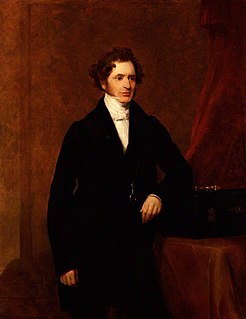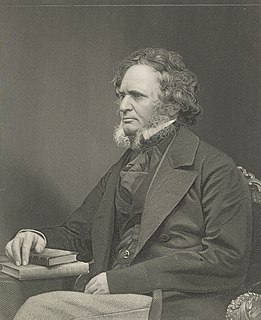Related Research Articles

George Hamilton-Gordon,4th Earl of Aberdeen,,styled Lord Haddo from 1791 to 1801,was a British statesman,diplomat and landowner,successively a Tory,Conservative and Peelite politician and specialist in foreign affairs. He served as Prime Minister from 1852 until 1855 in a coalition between the Whigs and Peelites,with Radical and Irish support. The Aberdeen ministry was filled with powerful and talented politicians,whom Aberdeen was largely unable to control and direct. Despite his trying to avoid this happening,it took Britain into the Crimean War,and fell when its conduct became unpopular,after which Aberdeen retired from politics.

John Russell,1st Earl Russell,,known by his courtesy title Lord John Russell before 1861,was a British Whig and Liberal statesman who served as Prime Minister of the United Kingdom from 1846 to 1852 and again from 1865 to 1866.

The 1852 United Kingdom general election was a watershed in the formation of the modern political parties of Britain. Following 1852,the Tory/Conservative party became,more completely,the party of the rural aristocracy,while the Whig/Liberal party became the party of the rising urban bourgeoisie in Britain. The results of the election were extremely close in terms of the numbers of seats won by the two main parties.

The 1847 United Kingdom general election was conducted between 29 July 1847 and 26 August 1847 and resulted in the Whigs in control of government despite candidates calling themselves Conservatives winning the most seats. The Conservatives were divided between Protectionists,led by Lord Stanley,and a minority of free-trade Tories,known also as the Peelites for their leader,former prime minister Sir Robert Peel. This left the Whigs,led by Prime Minister Lord John Russell,in a position to continue in government.
The Peelites were a breakaway dissident political faction of the British Conservative Party from 1846 to 1859. Initially led by Robert Peel,the former Prime Minister and Conservative Party leader in 1846,the Peelites supported free trade whilst the bulk of the Conservative Party remained protectionist. The Peelites later merged with the Whigs and Radicals to form the Liberal Party in 1859.

Edward Smith-Stanley,14th Earl of Derby led the "Who? Who?" ministry,a short-lived British Conservative government which was in power for a matter of months in 1852. Lord Derby was Prime Minister and Benjamin Disraeli served as Chancellor of the Exchequer. It marked the first time the protectionist wing of the Conservative Party had taken office since the Corn Laws schism of 1846. It is also called the First Derby–Disraeli ministry.

Edward Cardwell,1st Viscount Cardwell,was a prominent British politician in the Peelite and Liberal parties during the middle of the 19th century. He is best remembered for his tenure as Secretary of State for War between 1868 and 1874 and,with William Ewart Gladstone's support,the introduction of the Cardwell Reforms. The goal was to centralise the power of the War Office,abolish purchase of officers' commissions,and to create reserve forces stationed in Britain by establishing short terms of service for enlisted men.

Edward Horsman PC,PC (Ire),was a British politician.
Cambridge University was a university constituency electing two members to the British House of Commons,from 1603 to 1950.
Oxford University was a university constituency electing two members to the British House of Commons,from 1603 to 1950. The last two members to represent Oxford University when it was abolished were A. P. Herbert and Arthur Salter.
Oldham was a parliamentary constituency centred on the town of Oldham,England. It returned two Members of Parliament (MPs) to the House of Commons of the Parliament of the United Kingdom. The constituency was created by the Great Reform Act of 1832 and was abolished for the 1950 general election when it was split into the Oldham East and Oldham West constituencies.
Dartmouth,also sometimes called Clifton,Dartmouth and Hardness,was a parliamentary borough in Devon which elected two Members of Parliament (MPs) to the House of Commons in 1298 and to the Commons of England,Great Britain,and the United Kingdom from 1351 until 1832,and then one member from 1832 until 1868,when the borough was disfranchised.
Richard John Charles Rivers Ker was an Irish politician and first-class cricketer.
Events from the year 1852 in Scotland.

Thomas Greene was a British Peelite,Conservative and Tory politician.
Quintin Dick was an Irish Peelite,independent,Conservative,and Tory politician,and barrister.
Roger Johnson Smyth was an Irish Conservative and Peelite politician.
Joseph Sandars was a British Conservative politician.
John Attwood was a British Conservative and Peelite politician.
References
- ↑ Leigh Rayment's Historical List of MPs – Constituencies beginning with "O"
- ↑ Craig, F. W. S., ed. (1977). British Parliamentary Election Results 1832-1885 (e-book) (1st ed.). London: Macmillan Press. ISBN 978-1-349-02349-3.